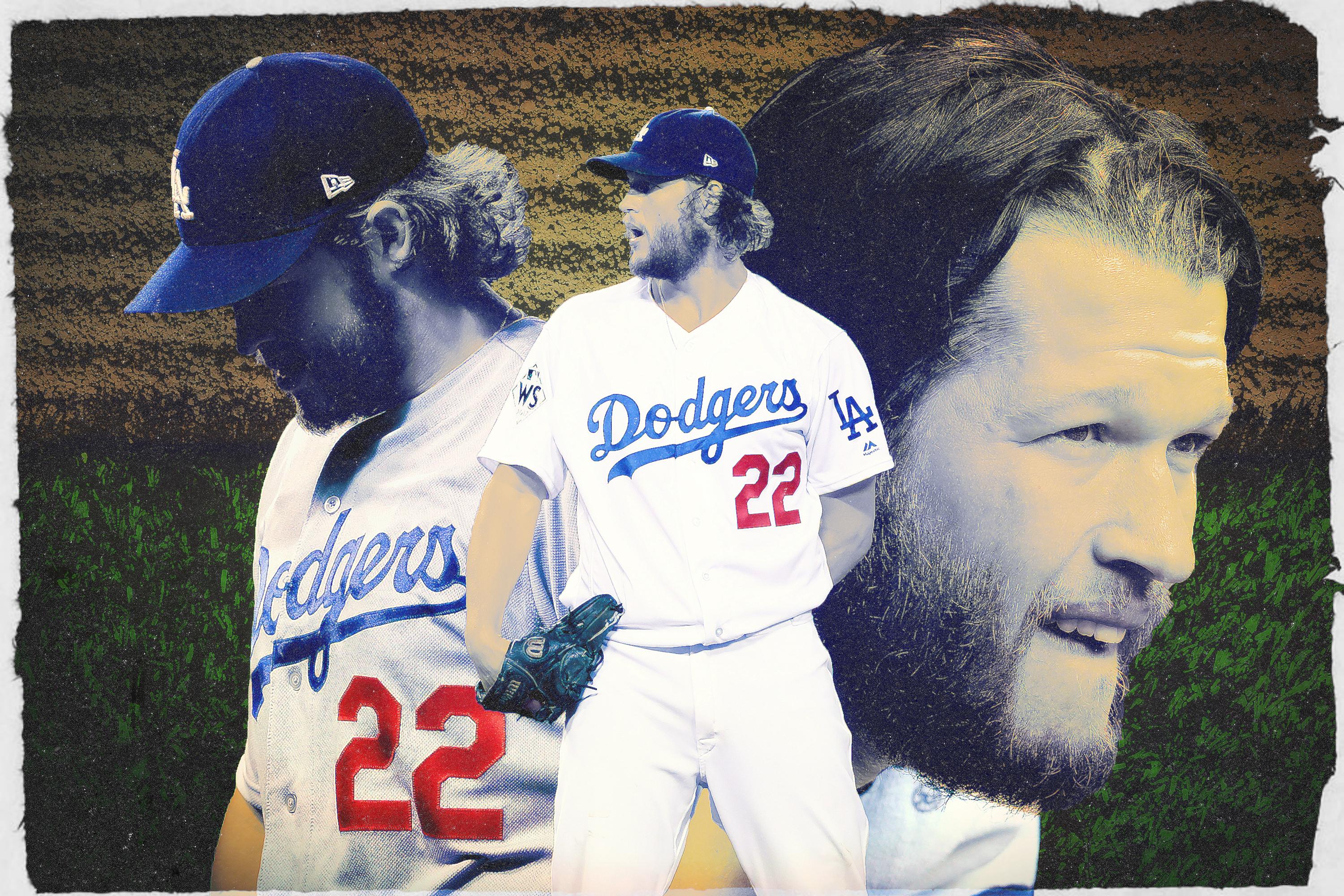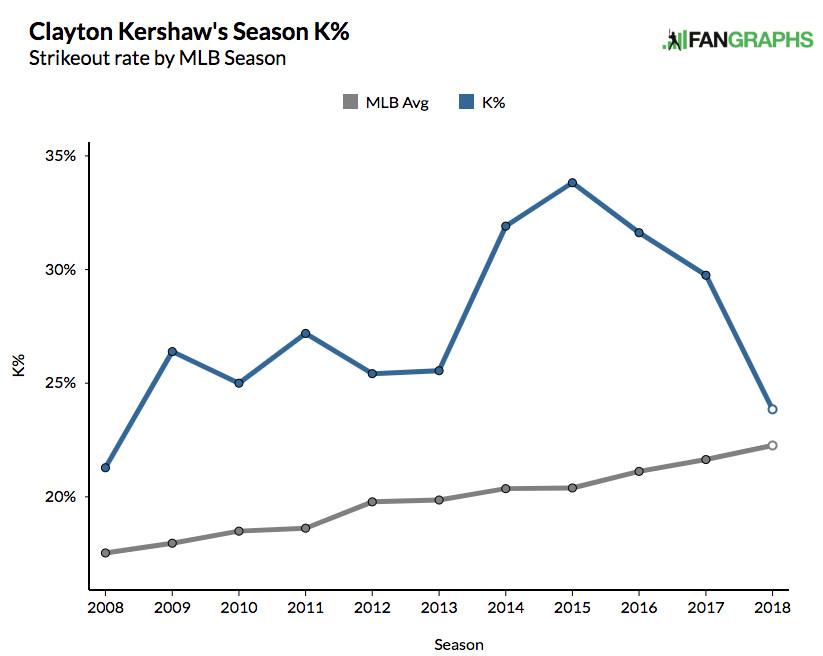
Clayton Kershaw wasn’t quite testy with reporters last week, but he wasn’t exactly forthcoming with his emotions either. There’s nothing wrong with that, with the greatest pitcher of a generation remaining reserved on the cusp of yet another postseason run, but in a year of unprecedented flux for the 30-year-old Dodgers ace, it’s natural to poke and prod any signs of decline.
So when manager Dave Roberts announced that Kershaw would start Game 2 of the NLDS instead of his customary opener, it was also natural to read into the southpaw’s less than reassuring responses in his first press conference of the playoffs.
Q: In the conversation [about starting Game 2], did you ask why?
Kershaw: I did. Yeah.
Q: Did you get an answer?
Kershaw: I did.
Q: Would you like to share it?
Kershaw: No. I mean—no, not really.
A minute later, Kershaw expanded on his thoughts, if only in the number of words he used to express them and not in the actual introspection he shared. “It wasn’t really an agree-or-disagree-type thing, I guess,” he said. “They had their reasons, and I accepted them.”
A week later, that apparent displeasure is all but forgotten. Kershaw will receive the start against Milwaukee in Friday’s NLCS Game 1, and he will enter Miller Park looking to build on the best playoff start of his career—and, by game score, the best for any Dodgers starter since Orel Hershiser tossed a shutout in the 1988 World Series.
Kershaw dominated the Braves last Friday with eight shutout innings, but his effort yielded little effect on the overall perception of his playoff performance. Short of throwing the third no-hitter in postseason history, nothing he does against Milwaukee will make a dent either. Rather, Kershaw’s stuck in a Groundhog Day on the diamond, forced to relive the same narrative, over and over, until he can break free of the exhausting loop.
Once again, he’s the best pitcher on a National League contender; once again, he’s trying to win the Dodgers their first World Series since 1988; once again, he’s trying to go an entire postseason without a start that bloats his ERA and adds another worrisome line to his uneven playoff ledger. Kershaw has already won one MVP, three Cy Youngs, and five ERA titles, and he would soar into Cooperstown if he retired tomorrow. But his legacy has been stuck for years on this one little snag; once again, all he can do is wait—and hope, and strive—for a title.
Baseball isn’t basketball, where the best player usually wins, or football, where a top quarterback who can’t win a Super Bowl is a historical anomaly. The egalitarian nature of the bat-and-ball sport often produces mismatches between team and player talent; for proof, Kershaw needs to look no further than Anaheim, where Mike Trout has never won a playoff game, through no fault of his own.
But over a whole career, a pitcher of Kershaw’s stature not hoisting the trophy is still rather puzzling. Ten pitchers have won three or more Cy Youngs; the eight retired hurlers all won at least one World Series, while both Kershaw and Max Scherzer are still searching. And for a number of those past victors, the crucible of a World Series inspired indelible memories: Sandy Koufax threw a Game 7 shutout on two days’ rest; Tom Seaver threw a 10-inning complete game; Randy Johnson did everything short of hit the dang walk-off himself for Arizona in 2001. Kershaw’s playoff highlight, for comparison, came in the NLDS—a triumphant moment, to be sure, but two rounds too early to appear at the top of his Baseball-Reference page.
Unlike Trout, he hasn’t lacked in opportunity either. The Dodgers have won six division titles in a row and made four NLCS appearances in that span, and Kershaw has thrown 60 percent more playoff innings than any other pitcher since 2013 besides Jon Lester, whom he leads by only a small margin. It seems like Madison Bumgarner and Scherzer and Corey Kluber and David Price have been playoff staples, each crafting their own compelling narratives, but they haven’t approached the October omnipresence of the Dodgers lefty. In L.A.’s franchise history, you could add the pitchers with the second- and third-most playoff innings (Don Sutton and Fernando Valenzuela, respectively), and Kershaw will tie their combined total with 5 2/3 frames against Milwaukee.
The circumstances in 2018 are the same as they have been throughout most of that span, but Kershaw himself has changed. Two months after winning his last Cy Young and his lone MVP award in 2014, he became a father. Now, he has two children, who are old enough to make press conference appearances and receive questions themselves.
On the field, Kershaw isn’t the same unimpeachable pitcher he was when the Dodgers’ streak started. In the 2018 regular season, a 2.73 ERA was his worst since 2010, before he won a single award or made an All-Star team, and nine regular-season wins were his fewest since 2009, which is so long ago that in that year’s NLCS against the Phillies, the Dodgers elected to start Vicente Padilla instead of Kershaw in an elimination game. Even the way and frequency with which Kershaw fools hitters has changed. A 24 percent strikeout rate was his lowest since his rookie year a decade prior, and his decline was even more noticeable when contrasted with the ongoing leaguewide surge. For the first time, Kershaw’s strikeouts came barely more often than the average MLB pitcher’s.

That shift appeared in his start against Atlanta last Friday, when Kershaw bamboozled the Braves’ bats but tallied only three strikeouts across his eight innings. He’d gone lower in just one previous playoff start—last year’s Game 5 fireworks show against the Astros. This time, though, Kershaw surrendered just two hits, one an infield single, and took advantage of a young and overeager Braves lineup, which was perhaps pressing after being shut out the night before by fellow southpaw Hyun-Jin Ryu.
In 19 previous playoff starts, Kershaw had thrown a first-pitch fastball to at least 60 percent of opposing hitters every single time; on Friday, just 34.6 percent of his 0-0 offerings were fastballs. This variation kept Atlanta off-balance, and the aggressive Braves—who led the majors in first-pitch swing percentage in the regular season—never adjusted. It felt like every other pitch produced a weak ground ball, and this pattern permitted Kershaw, who threw just 85 pitches, to collect the most efficient per-pitch performance for a playoff starter since 2006.
“The biggest thing is soft contact—soft contact, strikeouts,” Kershaw said after the game. “Obviously, there’s going to be certain situations where you need strikeouts, but get outs as fast as possible, that’s the biggest thing for me. So however I can do that in an efficient manner is great.”
That approach may need reworking against Milwaukee, whose hitters are notably more patient than Atlanta’s. Travis Shaw, Lorenzo Cain, Christian Yelich, and Jesús Aguilar all managed double-digit walk rates this season, and the newly homer-prone Kershaw might struggle against this particular lineup in this particular park.
That the notion of postseason struggles is even a foreseeable possibility from Kershaw is a testament to his history: Among pitchers who have thrown at least 75 career playoff innings, he has the second-worst difference between his regular-season and postseason ERA. It’s not a charitable or even equitable view, as Kershaw can pitch like a multiple–Cy Young winner in the playoffs, too—even the more pedestrian version of the once-untouchable ace we’ve seen in recent seasons. Last October, he won the NLCS clincher with six innings of one-run ball against the Cubs, outdueled Dallas Keuchel in Game 1 of the World Series with 11 strikeouts and one run allowed, and tossed four shutout frames in relief in Game 7 against Houston on just two days of rest.
Yet the clearest memory of Kershaw’s 2017 postseason comes from Game 5 against the Astros, when he allowed six runs in 4 2/3 innings and failed, twice, to hold a large lead in the most raucous playoff game in recent memory. He adopted the same forlorn expression he has worn time and time again before in October, and over the years it seems to have grown even more resigned. “Really,” his unblinking eyes ask, “again?” A slider hangs in the zone, a batter thwacks it 400 feet, and Kershaw turns and gazes at the vapor trail in disbelief.
If all goes as expected over the next week, Kershaw will return to that same spot with the 2018 title on the line. Both the Astros and Dodgers are the road teams in their respective championship series, but both have stronger rosters than their opponents—particularly L.A., which FanGraphs pegs as a 7-in-10 favorite against Milwaukee. Even if those odds seem a tad optimistic for the underdog by seeding, the Dodgers have evinced little vulnerability in recent early rounds: Against NL opponents the past two postseasons, they’re 10-2 with a plus-41 run differential and haven’t lost a single game by more than one run.
The last World Series rematch occurred 40 years ago, but the most fitting outcome for Kershaw, who has been stuck in a metaphorical playoff loop for years, would be a second chance after last season’s disappointing finish, making that metaphor manifest. It could be his last chance in L.A., too, as Kershaw could opt out of the remaining two years on his contract and sign elsewhere this offseason. Even if the possibility that he’ll leave is remote, the context boosts the urgency even higher; every Kershaw playoff start now could, theoretically, be his last in Dodgers blue.
For now, the Dodgers are playing the long game, which is what made the end of Kershaw’s start against Atlanta so stirring for the crowd. The 54,452 fans had spent the night cheering for their ace like 54,452 fretful parents—anxious at the slightest sign of struggle but overwhelmingly proud of their boy’s accomplishments aside. The latter was in far greater supply on Friday and continued through the top of the eighth inning, when Kershaw froze Ender Inciarte with a fastball for the second out and fanned Charlie Culberson with a full-count slider for the third. The ensuing roar was as loud as any the Dodger Stadium throng conjured through last season’s World Series run.
Minutes later, the decibel level rose even higher when Kershaw unexpectedly climbed the dugout steps and trotted back toward the mound, the only Dodger to take the infield for a few long moments. Here was Kershaw, alone, the center and subject of all attention, the protagonist in every Dodgers narrative—and then there was Roberts, tracing Kershaw’s steps to the mound and taking the ball from his star. It was a bit of managerial legerdemain, and for the first time all game, boos rained from the crowd, if only for a moment, before the applause returned in force for Kershaw’s final ovation of the night.
“Every pitcher that starts a game wants to finish a game,” Roberts said afterward. “I absolutely understand and appreciate that. But our goal is to win 11 games. And so I just felt that it was the right decision, and Clayton is 100 percent on board with what we’re doing, and he wants to win a championship.”
Throwing an extra inning to record a complete game wouldn’t have mattered for Kershaw’s postseason legacy, which at this point cares about only the ultimate goal and not the journey leading up to it. That’s a nihilistic outlook and not a fair one, necessarily, but it exists only because Kershaw has already done everything else and taken every step on the journey but the last. The pitcher who defines a generation needs a title to match, and he has another premium opportunity in 2018. He’s only one start in, but he looks prepared to meet the challenge once again.

